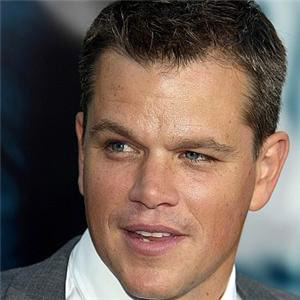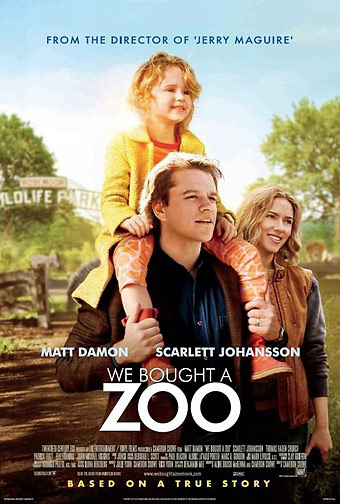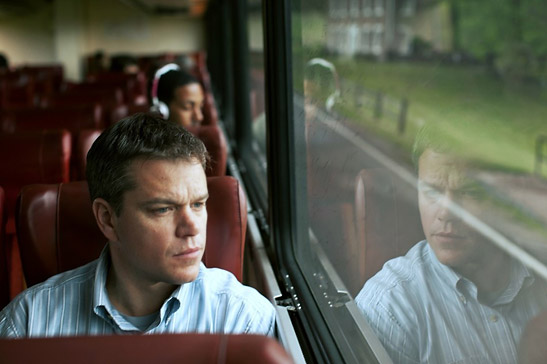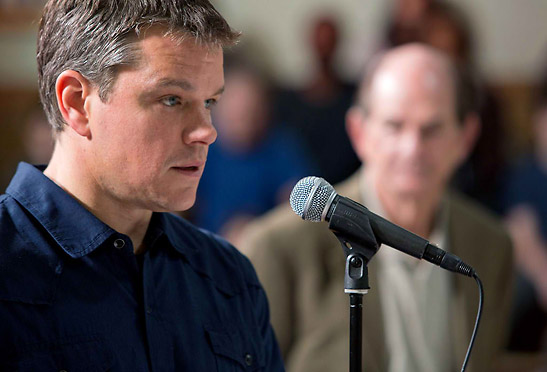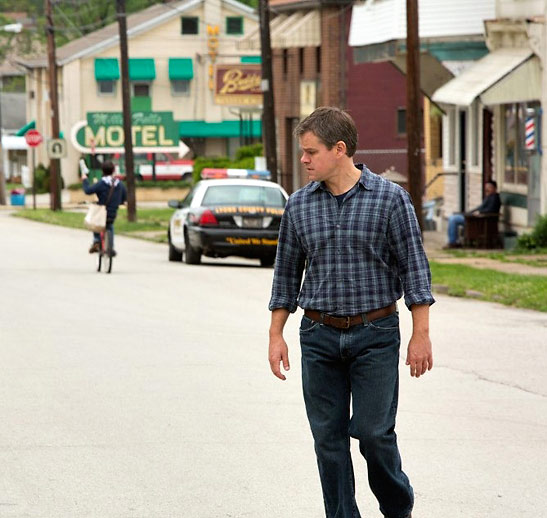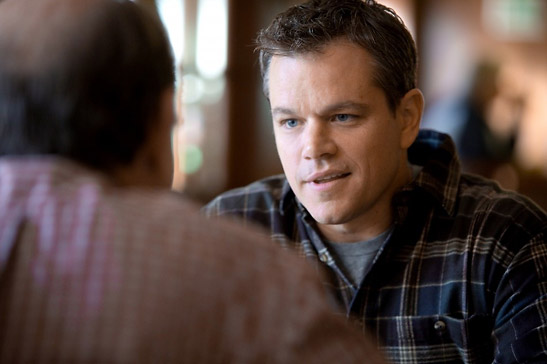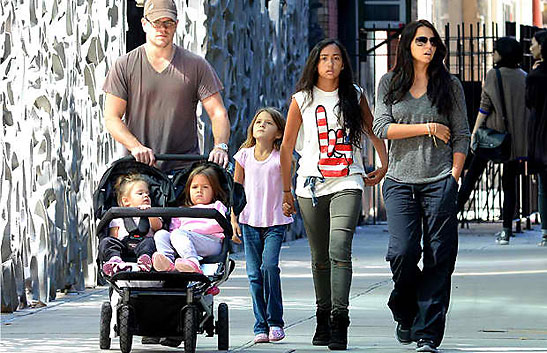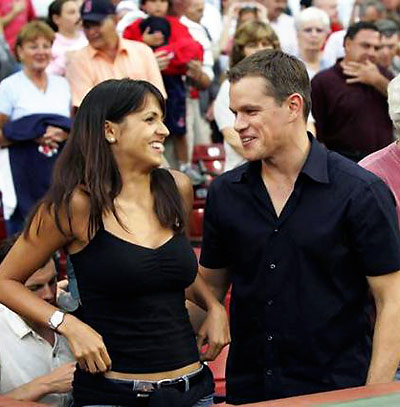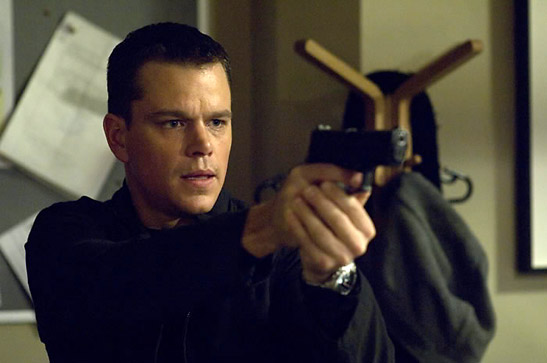 |
 |
|
 |

|
Matt Damon on "Promised
Land"
And His Clashing of Cultures On Celebrating Christmas Beverly Cohn Entertainment Editor The Road to Hollywood
An international movie star, Matt is also a devoted husband and father and he and his wife Luciana Barroso have four daughters: Alexia, Isabella, Gia, and Stella. Matt recently sat down with a select group of journalists to discuss, among other personal topics, his latest film "Promised Land" which he co-wrote and co-stars in with John Krasinski. Directed by Gus Van Sant, the film also features Frances McDormand, Hal Holbrook, and Rosemarie DeWitt, and explores the controversial subject of hydraulic fracturing, or "fracking," a process of drilling and injecting fluid into the ground at a high pressure in order to fracture shale rocks to release natural gas inside. The following has been edited for content and continuity for print purposes.
What is the genesis of "Promised Land?" Matt: Originally, John (Krasinski) had kicked around ideas with Dave Eggers (story writer) and they had come up with salesmen coming to a town to sell leases to drill for natural gas and the story was starting to coalesce and they started to think about these characters. Then Dave had to go write a book and John brought this to me and we agreed to sit down and write it and see what happens. We really wanted to write about American identity - where we've come from, where we are now, and where we're headed. We knew we wanted a hopeful ending and we wanted it to be a pro-community, pro-democracy type of movie. How did the collaboration work? Matt: He was doing the show ("The Office") and I was doing "We Bought A Zoo," so I was out in California and John would show up Saturday mornings for breakfast. We would write all day and then do it again on Sunday. Then during the week we would revise on our own and scribble notes in the margins and then we would come back and do it again. Within a couple of weeks it was clear that we were really making progress and that we might actually make a movie.
You presented a very balanced perspective on fracking. What kept you on that course? Matt: We just didn't want to have an answer because it wasn't about that. In the end my character (Steve Butler) says, "This is your decision" and that's what why we didn't show the outcome of the vote. He goes to this woman (Rosemarie DeWitt) and is about to pitch her on a lease and she talks about not being the one to let her land go and talks about the garden where she brings the kids and he jokes "You're teaching farming kids how to garden?" And she says, "I'm teaching them how to take care of something." That idea of stewardship starts to get at him and he begins to feel like the democratic process is being hijacked by corporate malfeasance.
Is this a good way to get across the message across? Matt: Maybe it's a way to start a conversation because at the end the point is if you don't get involved in the decision, it's going to get made for you and that true. But nobody wants to go see a movie where they get a message so that really wasn't our intent. It was just to show this moment in time in our country and the stakes when big money collides with real people who are struggling on the back end of a recession. Did you know a lot about fracking? Matt: I had seen stories on fracking but hadn't really paid much attention to them. With four young kids, I just wasn't engaged with that subject, but when it became a potential backdrop for our movie, I started looking at it and the more we looked at it, the more we saw how people were divided. For some, it is a temporary lifeline, but there are potential downstream horrific outcomes. If you believe the energy industry, there are potential downstream benefits that we can't even imagine and geopolitical benefits. It's such a high stakes game, that it's a perfect place to set a movie because it's about the decisions we make as communities and taking responsibility and to show the human side without making it a polemic.
What did your research reveal? Matt: There are cases where people have refused to let companies drill on their land and these guys have gone to a neighboring property and came under their property taking it anyway (the natural gas). Those are the conversations that are going on and the decisions that a lot of these communities have to make are based on if they don't do it, they're going to do it next door so if there is a downside, we'll experience the downside anyway, and then there's obviously money in the middle of it. You have a lot of people who have become millionaires and did so to save their farms and to save their way of life. It's very complex and people feel very strongly about it.
Did you get feedback from the local farmers in Pennsylvania? Matt: The first day we were filming some farmers showed up and asked if this was a movie about fracking and that we shouldn't say anything bad about it. There were people from the other side saying don't show a good side of this. It's terrible. It's ruining our water. It's causing climate change. People are getting sick. When you're in character, as the writer if you hear a line that's not working how do you handle that? Matt: If you and I were doing and scene and having a conversation, if a line wasn't working, it wouldn't be working for both of us. You'd feel it because something in the interaction wouldn't be quite right. It's not like putting on a different hat because there's so much overlap in all the disciplines, like writing and acting are intertwined a lot of the time. It's really about problem solving and I've come to look at it like a magic trick rather than when I started out when I believed that I had to live everything and live it all the time, but the more I learned about making films, the more I found that it is a magic trick pulled off by the creative team involved in making the film. What's an example of making a shot work? Matt: Let's say the shot is over my shoulder and it's on you. Now if I'm angsting away, all I'm doing is screwing up the shot, so the best thing I can do is to make sure I am exactly on my mark and then just be locked on you giving you whatever you need because the shot's about you and not about me. So when can we do this? (laughter) (Matt continues his previous thought) Matt: I think acting becomes less selfish and the more experience you have making movies, the less selfish you become about your process. Was it hard to let go of your original intention to direct this film? Matt: It was tough for me to give it up, but you know the joke John (Krasinski) made was that my greatest contribution as a producer was firing myself as the director and hiring Gus. (laughter) I would have been away too long from my family and that would have distracted me and I wouldn't have done a good job. Do you have the same "giddiness" you had when you first began your acting career and how has your outlook changed? Matt: I really love working. My life is different from fifteen years ago, but my love of doing this hasn't changed at all and I feel equally giddy to go to work and feel unbelievably lucky to work with people like (Steven) Soderbergh or Clint, (Eastwood) or Paul Greengrass. I've become more convinced fifteen years later that it's a director's medium and the most important choice is the director. I use to think script, director, and role and I do look at the role, and do I have something to bring to it, but it's really for me about working with the director. A great director can make a mediocre script into a great film, but a bad director will make a great script into a mediocre film.
Will you put directing on the back burner until the kids are older? Matt: I could take them and we could go on an adventure together somewhere. Originally this was supposed to be shot in New York. We were going to try to do it in the zone which meant I could live at home and then as we started looking at stuff, we realized we were going to either go upstate or go to Pennsylvania so I would have been twelve weeks away in pre-production, six or seven weeks shooting and then I could have posted it (post production) and stayed at home and edited it wherever the kids were, but still it was too much.
You're married to a woman (Luciana Barroso) from a different culture. Does it effect how you celebrate the holidays? Matt: A big difference is they celebrate Christmas Eve and we celebrate Christmas Day and so we have this bizarre Christmas fusion where the kids open a bunch of presents after dinner on Christmas Eve and then again on Christmas morning. We're basically working it out, but it's a win win for the kids. (laughter) When I met my wife I was like Christmas Eve, what are you crazy? Who wants to get up on Christmas morning? What do we tell the kids - that Santa Claus came while we were having dinner? (laughter) And what does that teach them? This guy is working his ass off flying around the world and we don't even invite him to sit down and eat with us? (laughter) That's not a good lesson. Are your children bi-lingual? Matt: Some of them are. My two-year-old is bi-lingual. My four-year-old is not. We've been reading about how to do it and are still learning, so we've been hit or miss, but now we're very rigorous with our two-year-old. I speak a little Spanish but you really want one parent speaking one language and the other speaking the other language. I keep dreaming that Pedro Almodovar will give me a job (laughter) and I can go to a Spanish-speaking country and bring the kids. Spanish was my wife's first language and she went to kindergarten not speaking English because both her parents spoke Spanish in the house and she learned English right away. She was raised in Florida and here in southern California and you wouldn't think she spoke Spanish if you talked to her. So she's truly bi-lingual. So the kids hear a lot of Spanish around the house. They know more Spanish than they even think they know, but the only one really speaking it is our two-year-old.
I can't resist asking this question. Is Jason Bourne out of your psyche? Matt: No. I want to do another one. We were very close to making one a few years ago but we just couldn't crack the story. The studio made a deal with the estate that they had to get a Jason Bourne movie out for 2012 so when we couldn't figure out a story, they figured out another way to get a Jason Bourne movie out so they wouldn't be in breach of their contract with the estate and that's when Tony (writer Tony Gilroy) came up with the idea of doing one with Jeremy (Renner) and that's what they did. But, I talk to Paul (director Paul Greengrass) about it occasionally and it's really just a question of how do you bring a character back and is there a movie as good as the other three we did. If we felt like there was, then we'd do it, but we haven't cracked it yet. I gave it to Jonah Nolan who did such a beautiful job with the Batman mythology and met with him. He took a month to work on it but came back and said he can't figure out how to do it. We intended it to be a trilogy so the question is how do you get that character going again. What gets you out of bed every morning and are you in fear of ever losing "it?" Matt: Kids literally get me out of bed. (laughter)
The important things I have and as far as my career…Well, look
what happened to Ben (Affleck). He got put into actor jail for
a while but we always felt we could write our way out of that. We came
from nowhere, but if you can write, you can write yourself a part and
that's what Ben did. He did it once with "Good Will Hunting,"
and then again with "The Town" and now "Argo," so
that gives me hope that no matter what happens there's always that fall
back position. |
This site is designed and maintained by WYNK Marketing. Send all technical issues to: support@wynkmarketing.com

|











